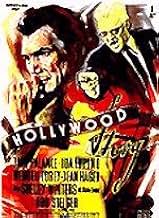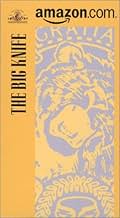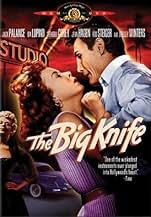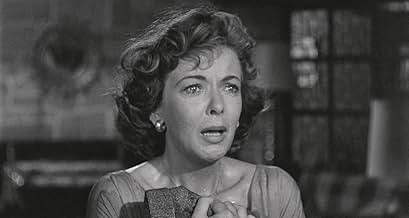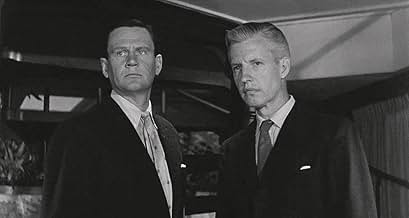NOTE IMDb
6,8/10
4,6 k
MA NOTE
Ajouter une intrigue dans votre langueHollywood actor Charles Castle is pressured by his studio boss into a criminal cover-up to protect his valuable career.Hollywood actor Charles Castle is pressured by his studio boss into a criminal cover-up to protect his valuable career.Hollywood actor Charles Castle is pressured by his studio boss into a criminal cover-up to protect his valuable career.
- Réalisation
- Scénario
- Casting principal
- Récompenses
- 1 victoire et 2 nominations au total
Michael Winkelman
- Billy Castle
- (as Mike Winkelman)
Shelley Winters
- Dixie Evans
- (as Miss Shelley Winters)
Richard Boone
- Narrator
- (voix)
- (non crédité)
Nick Cravat
- Nick
- (non crédité)
Robert Emhardt
- Bit Part
- (non crédité)
Michael Fox
- Prize Fight Announcer
- (non crédité)
Paula Kyle
- Party Guest
- (non crédité)
Avis à la une
Too talky for some, too stage-bound for others, too strident for all, this is not a movie for everyone. Yet The Big Knife continues to fascinate at the same time it annoys. Maybe it's the savage depiction of Hollywood politics and the amoral glamour industry surrounding it. After all, neither blackmail nor murder is off-limits to ego-maniacal studio boss Stanley Hoff ( vintage Rod Steiger), while the human sharks swimming around him behave nothing like opening night at the Oscars. Maybe it's the sterling cast, featuring such 50's exotica as Steiger, Jack Palance, Wendell Corey, and Shelley Winters. In the end, of course, everyone gets to explode on screen except the ice cold Corey whose chronic bemusement proves ultimately more satanic than cynical. Whatever the reason, the result is an over-the-top cavalcade of unusual flair.
It's likely that producer-director Robert Aldrich targeted the film in behalf of blacklisted mentor Abraham Polonsky with whom he had collaborated on 1948's Force of Evil. After all, the year was 1955 and the all-powerful list could not be attacked directly, so what better vehicle than Clifford Odet's corrosive stage play adapted for all America to see. (Odets would do the same for Broadway in 1957's revealing Sweet Smell of Success.) It's fun to imagine how Aldrich's resulting indictment played in studio screening rooms where real reputations were at stake. Then too, much of the film's dirty laundry appears based on fact. The hit and run on Clark Gable's hushed-up 1933 episode; the Palance character on John Garfield's death at 39, listed officially as heart attack. It's hard to picture the producers ever believing such curdled fare would actually make money. Of course it didn't, angering many ticket-buyers with a title that seemed to imply real action instead of endless palaver. Still, this overheated exercise in shameless baroque remains an interesting oddity. A permanent record not only of individual styles, but of artistic protest amidst the throes of cultural repression.
It's likely that producer-director Robert Aldrich targeted the film in behalf of blacklisted mentor Abraham Polonsky with whom he had collaborated on 1948's Force of Evil. After all, the year was 1955 and the all-powerful list could not be attacked directly, so what better vehicle than Clifford Odet's corrosive stage play adapted for all America to see. (Odets would do the same for Broadway in 1957's revealing Sweet Smell of Success.) It's fun to imagine how Aldrich's resulting indictment played in studio screening rooms where real reputations were at stake. Then too, much of the film's dirty laundry appears based on fact. The hit and run on Clark Gable's hushed-up 1933 episode; the Palance character on John Garfield's death at 39, listed officially as heart attack. It's hard to picture the producers ever believing such curdled fare would actually make money. Of course it didn't, angering many ticket-buyers with a title that seemed to imply real action instead of endless palaver. Still, this overheated exercise in shameless baroque remains an interesting oddity. A permanent record not only of individual styles, but of artistic protest amidst the throes of cultural repression.
One of the 10 best of '55 with sparks flying between Palance & Steiger. Subtle performance by Ms. Ida Lupino and intensity personified by J. Palance. Rod Steiger with white hair and hearing aid is pretty scary. Written by Clifford Odets, this realistic Hollywood tale cuts no corners and does not see out.
An 8 out of 10. Best performance = Rod Steiger. Too grim for some. Beautiful B/W cinematography and terrific script and the entire cast is deliberate and impassioned. I don't believe it was nominated for anything, but should have been. I'm not sure if this is on video or DVD, but check it out!
An 8 out of 10. Best performance = Rod Steiger. Too grim for some. Beautiful B/W cinematography and terrific script and the entire cast is deliberate and impassioned. I don't believe it was nominated for anything, but should have been. I'm not sure if this is on video or DVD, but check it out!
The Big Knife is a mostly good adaptation of a Clifford Odets play about a Hollywood actor who's being blackmailed into studio servitude while trying to patch up his failing marriage. This is a movie for which the word powerful was truly invented. Most of the film takes place on one set and places heavy emphasis on speeches from the individual characters for its really riveting moments (as I would expect from a stage play), but those moments definitely get across. The whole cast is good, but Jack Palance in a nuanced and fiery performance as the actor Charlie Castle, and Rod Steiger, giving a deeply felt and passionate realization of the corrupt studio boss are nothing short of superb. The screenplay is full of smart, incisive, biting dialogue as well. Except for a melodramatic turn at the end, that, for me, takes a lot of the edge off the story, this is a well-acted film that is solid, though not spectacular, entertainment. 3*** out of 4
"The Big Knife" caused a sensation when it came out. After all, no one in his right mind would dare to criticize the movie industry, after all, it was the studio and its ruthless executives that were exposed as the bad guys, even at the time where the old studio system was disappearing.
Clifford Odets wrote the original play, which under Robert Aldrich direction doesn't translate to the screen because it feels claustrophobic in many aspects. The movie treatment was by James Poe, did not make the material come alive because of the theatricality of the source.
Charles Castle, an actor working in Hollywood, is about to commit himself to a renewal of his contract to a major studio. That means another seven years of his life working in whatever pictures the higher ups have in store for him. It couldn't come at a worse time; his wife, Marion, who evidently hasn't a good relation with Charles, is fed up with the idea of staying in Bel Air. Marion pleads with him to give up the movie business so they could have a normal life bringing up their young son.
Castle has had his share of adventures in Hollywood, something that Marion is aware of. In addition to that, he has a dark secret, something that involved a terrible accident for which his publicist has taken the blame and has even serve time in jail. A couple of women are also in the picture, threatening Charles' marriage.
To make matters worse, Charles is visited by the head of the studio, Stanley Hoff, who has brought his assistant, the oily Smiley Coy, to help him convince Castle to sign the contract. Charles Castle is finally defeated at the game as Stanley plays his cards right since he has the upper hand. The result is a bitter loss for the actor, who sees no way out of the situation at hand.
Jack Palance, who, up to this film, had only minor parts, rose to the challenge of playing Charles Castle, who in a way, he had the background, having been a boxer, to play. His work, although a bit unsure, was a revelation to the movie going public at the time. Ida Lupino, an excellent actress, is probably the best thing in the picture. Rod Steiger shows up as the studio head Stanley Hoff, a man that knows well his opponent's weaknesses and uses all in his power to get his way. Wendell Corey, in a small part, also does good work. Jean Hagen and Shelley Winters also contribute to the film.
Ernest Lazlo's cinematography works well, as does the musical score by Frank DeVol. Robert Aldrich, a man with a lot of experience in the business, was a natural choice to undertake the direction of this picture. His only problem was a basic one, how to open the play to cinematic terms.
Clifford Odets wrote the original play, which under Robert Aldrich direction doesn't translate to the screen because it feels claustrophobic in many aspects. The movie treatment was by James Poe, did not make the material come alive because of the theatricality of the source.
Charles Castle, an actor working in Hollywood, is about to commit himself to a renewal of his contract to a major studio. That means another seven years of his life working in whatever pictures the higher ups have in store for him. It couldn't come at a worse time; his wife, Marion, who evidently hasn't a good relation with Charles, is fed up with the idea of staying in Bel Air. Marion pleads with him to give up the movie business so they could have a normal life bringing up their young son.
Castle has had his share of adventures in Hollywood, something that Marion is aware of. In addition to that, he has a dark secret, something that involved a terrible accident for which his publicist has taken the blame and has even serve time in jail. A couple of women are also in the picture, threatening Charles' marriage.
To make matters worse, Charles is visited by the head of the studio, Stanley Hoff, who has brought his assistant, the oily Smiley Coy, to help him convince Castle to sign the contract. Charles Castle is finally defeated at the game as Stanley plays his cards right since he has the upper hand. The result is a bitter loss for the actor, who sees no way out of the situation at hand.
Jack Palance, who, up to this film, had only minor parts, rose to the challenge of playing Charles Castle, who in a way, he had the background, having been a boxer, to play. His work, although a bit unsure, was a revelation to the movie going public at the time. Ida Lupino, an excellent actress, is probably the best thing in the picture. Rod Steiger shows up as the studio head Stanley Hoff, a man that knows well his opponent's weaknesses and uses all in his power to get his way. Wendell Corey, in a small part, also does good work. Jean Hagen and Shelley Winters also contribute to the film.
Ernest Lazlo's cinematography works well, as does the musical score by Frank DeVol. Robert Aldrich, a man with a lot of experience in the business, was a natural choice to undertake the direction of this picture. His only problem was a basic one, how to open the play to cinematic terms.
The Big Knife (1955)
You always expect something edgy and a hair impolite with a Robert Aldrich film, from his over-the-top film noir cult classic "Detour" to the bizarre and gripping "What Ever Happened to Baby Jane?" It's almost as though his rich upbringing and rejection of a nice political life made him a fearless renegade. Give him credit. He cracked the Hollywood doldrums of the 1950s and early 60s like few other directors (Kubrick comes to mind as a big budget parallel).
So you can get a lot out of "The Big Knife" in understanding Aldrich. And you can really enjoy a superb set of performances, mainly by Ida Lupino as the leading man's wife, and by Everett Sloan in an aging version of his usual submissive chumminess. Rod Steiger is there, powerful and a bit overacted, if you can overact in an Aldrich movie, and the headliner, Jack Palance, does his best at being a leading man, and is pretty fine, especially since his role is as a Hollywood actor with flaws.
Throw in some really crisp cinematography by Ernest Lazlo, one of the best of his generation. Sometimes the camera will take on an angle that rocks you slightly, as when it is looking up from the floor at Palance on the massage table, with his agent towering overhead. More subtle is Lazlo's fluid long takes, or even fluid short takes, where the camera just makes sense of a scene not by framing it right (which is expected) but by moving it during the take. Once you notice it, you appreciate more and more how the interior of this house (the set for the whole movie) is made dimensional and alive.
I say all this up front because the movie struggles against the story and writing despite all this. It's a play adapted to the screen, but rather literally, with the one main set for all the shooting. And it talks a lot. I don't see this working even on a stage, where you want and get dialog. Here it's almost deadening. Not that it quite is ever boring, but it tries too hard, and it pulls a couple of sensational twists out as it goes, with another sensational twist at the end. On top of all that is just a level of credibility. None of these Hollywood businessmen strike you as quite right, and what they say or do is all caricature.
Not that we expect a movie, especially an Aldrich movie, to be believable. But there has to be some compensating excitement. This one, with a great noir title but no real noir qualities, never quite flies. It's worth watching if you like Lupino or Aldrich in particular, and it has moments of real intensity, but that might not be enough in the big picture.
You always expect something edgy and a hair impolite with a Robert Aldrich film, from his over-the-top film noir cult classic "Detour" to the bizarre and gripping "What Ever Happened to Baby Jane?" It's almost as though his rich upbringing and rejection of a nice political life made him a fearless renegade. Give him credit. He cracked the Hollywood doldrums of the 1950s and early 60s like few other directors (Kubrick comes to mind as a big budget parallel).
So you can get a lot out of "The Big Knife" in understanding Aldrich. And you can really enjoy a superb set of performances, mainly by Ida Lupino as the leading man's wife, and by Everett Sloan in an aging version of his usual submissive chumminess. Rod Steiger is there, powerful and a bit overacted, if you can overact in an Aldrich movie, and the headliner, Jack Palance, does his best at being a leading man, and is pretty fine, especially since his role is as a Hollywood actor with flaws.
Throw in some really crisp cinematography by Ernest Lazlo, one of the best of his generation. Sometimes the camera will take on an angle that rocks you slightly, as when it is looking up from the floor at Palance on the massage table, with his agent towering overhead. More subtle is Lazlo's fluid long takes, or even fluid short takes, where the camera just makes sense of a scene not by framing it right (which is expected) but by moving it during the take. Once you notice it, you appreciate more and more how the interior of this house (the set for the whole movie) is made dimensional and alive.
I say all this up front because the movie struggles against the story and writing despite all this. It's a play adapted to the screen, but rather literally, with the one main set for all the shooting. And it talks a lot. I don't see this working even on a stage, where you want and get dialog. Here it's almost deadening. Not that it quite is ever boring, but it tries too hard, and it pulls a couple of sensational twists out as it goes, with another sensational twist at the end. On top of all that is just a level of credibility. None of these Hollywood businessmen strike you as quite right, and what they say or do is all caricature.
Not that we expect a movie, especially an Aldrich movie, to be believable. But there has to be some compensating excitement. This one, with a great noir title but no real noir qualities, never quite flies. It's worth watching if you like Lupino or Aldrich in particular, and it has moments of real intensity, but that might not be enough in the big picture.
Le saviez-vous
- AnecdotesBecause of its vitriolic take on Tinseltown, this was unsurprisingly turned down by all the major studios in Hollywood. It eventually found a home at United Artists.
- GaffesThe camera and operator are visibly reflected in one scene in the living room.
- Citations
Smiley Coy: A woman with six martinis can ruin a city.
- Crédits fousIn the opening credits: Upholstered furniture by Martin/ Brattrud.
- ConnexionsFeatured in Les dossiers de l'écran: Les coulisses du cinéma (1970)
Meilleurs choix
Connectez-vous pour évaluer et suivre la liste de favoris afin de recevoir des recommandations personnalisées
- How long is The Big Knife?Alimenté par Alexa
Détails
Box-office
- Budget
- 423 000 $US (estimé)
- Durée1 heure 51 minutes
- Couleur
- Rapport de forme
- 1.85 : 1
Contribuer à cette page
Suggérer une modification ou ajouter du contenu manquant

Lacune principale
By what name was Le grand couteau (1955) officially released in India in English?
Répondre

